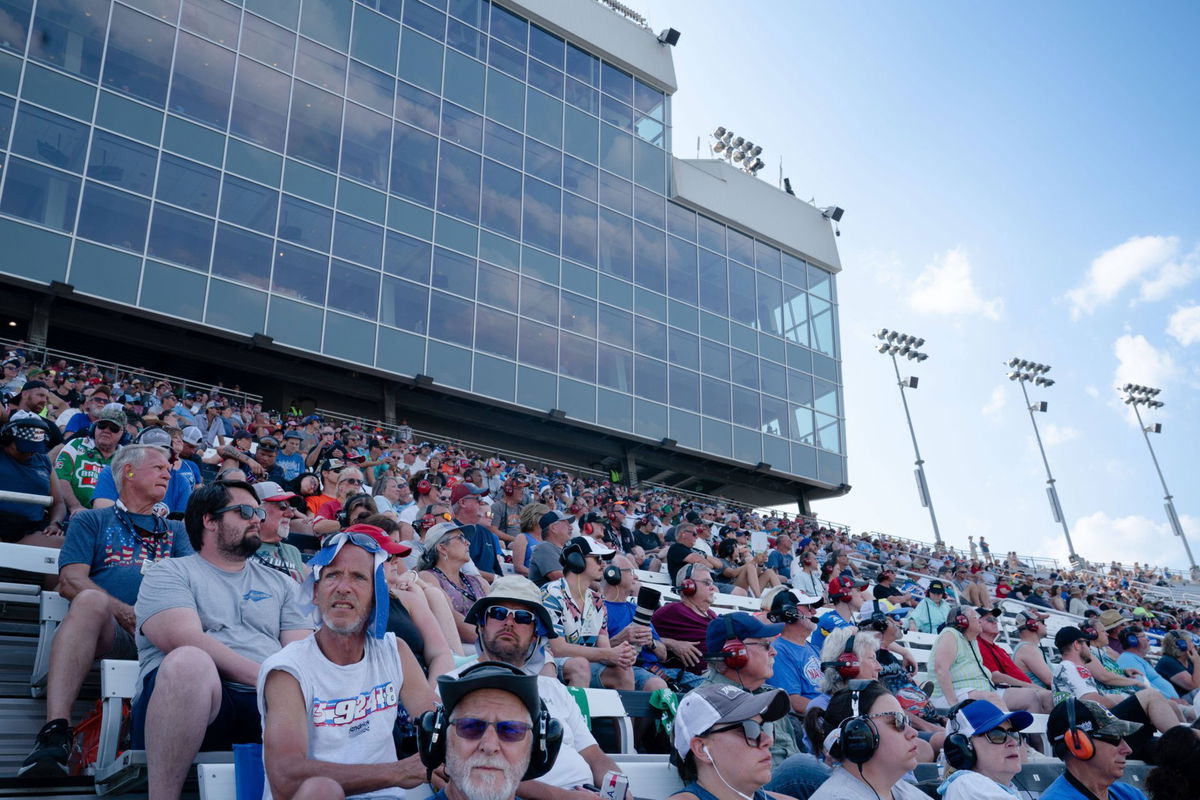
Imago
Syndication: The Tennessean Fans take in the race in the shade of the press box during the NASCAR Xfinity Series Tennessee Lottery 250 Race at Nashville Superspeedway in Lebanon, Tenn., Saturday, June 24, 2023. , EDITORIAL USE ONLY PUBLICATIONxINxGERxSUIxAUTxONLY Copyright: xDennyxSimmonsx/xThexTennesseanx 20948077

Imago
Syndication: The Tennessean Fans take in the race in the shade of the press box during the NASCAR Xfinity Series Tennessee Lottery 250 Race at Nashville Superspeedway in Lebanon, Tenn., Saturday, June 24, 2023. , EDITORIAL USE ONLY PUBLICATIONxINxGERxSUIxAUTxONLY Copyright: xDennyxSimmonsx/xThexTennesseanx 20948077
When does teamwork cross the line from strategy into manipulation? This question has been silently haunting NASCAR for years, but following a string of contentious incidents in recent races, fans nationwide are now shouting it out loud. Remember when Mark Martin achieved a noteworthy triumph at the Winston Select 500 on April 30, 1995?
Watch What’s Trending Now!
With two laps left, Martin passed Dale Earnhardt and held off Jeff Gordon to secure the victory in the final laps. Interestingly, Martin’s Ford was right behind Jeff Gordon’s Chevrolet at the time of this pivotal maneuver. “Jeff Gordon gave me a shove there at the end. He couldn’t go anywhere but line up behind me.” A Chevy helping a Ford? Yeah, we probably wouldn’t see this in modern-day NASCAR, and fans are irate.
Drafting is a crucial tactic in superspeedway races like Talladega and Daytona. Regardless of their team or manufacturer ties, drivers frequently work together to obtain aerodynamic advantages. This standard procedure is best illustrated by Gordon’s help to Martin, even if it came from a competitor manufacturer. However, this was 30 years ago, and in 2025, teams are more OEM-centric than ever before. And after the Martinsville fiasco in 2024, they had to even tweak the rulebook.
The 100% rule, which mandates that competitors race to the best of their abilities to secure the best possible finishing position in an event, has also altered the performance obligation for the competitors. Instead, the emphasis now is on “manipulating” the results of an event or championship. The rule now Section 10.5.2.8.c, reads: “Any Competitor(s) who attempts to manipulate the outcome of the Event or encourages, persuades, or induces others to manipulate the finishing positions of the Event shall be subject to a penalty from NASCAR.” To add to the penalty, it won’t be just the drivers facing harsh music, but the OEMs who give out these orders as well.
According to NASCAR, the revised rule also states the following: “NASCAR reserves the right to determine if an OEM has violated the NASCAR Rule Book and may impose penalties on the OEM or its representatives accordingly. The following framework serves as a general guideline for assessing OEM penalties. The examples provided are illustrative and not exhaustive, offering clarity on the types and ranges of infractions that may result in penalties, should NASCAR determine enforcement is warranted.”
Three drivers—Bubba Wallace, Ross Chastain, and Austin Dillon—were the focus of the issue during the Martinsville playoff race last year. They were penalized for serving the interests of other teams affiliated with the same manufacturer instead of their own. The Chevrolet-powered Dillon and Chastain, who race for Richard Childress Racing and Trackhouse Racing, respectively, positioned themselves behind Hendrick Motorsports driver William Byron in what appeared to be an effort to prevent competitors from passing him. In reaction to this, Bubba Wallace slowed down to help his fellow Toyota driver, Christopher Bell, to pass him and gain positions on Byron to advance to the Championship 4.
It was really messy, and NASCAR did not like it one bit. Authorities also penalized Wallace, Chastain, and Dillon were all fined $100,000 each, and so were their teams. It was arguably the biggest black mark on NASCAR since the ‘spingate’ incident in 2013 involving Martin Truex Jr., Clint Bowyer, and Michael Waltrip Racing.
Despite the rule change to penalize OEMs, fans still feel they play a huge role in impacting modern racing. And a recent Reddit post on the NASCAR subreddit ignited strong reactions.
Fans speak out against the OEM stranglehold on NASCAR
This past weekend, tensions over OEM-driven partnerships boiled over, and for many NASCAR fans, that line was not only crossed but burned beyond recognition. Fans no longer tolerate the organized, corporatist machine that has replaced the once-natural, driver-driven collaboration at superspeedways. One fan pointed out how the landscape has shifted dramatically over the last decade, saying, “OEM loyalty is a story as old as plate racing, but it feels like in the last 10 years that it’s evolved into a super-competitive thing that hurts the racing product.”
Their annoyance is not without justification. Stories like Jeff Gordon and underdog Trevor Bayne’s 2011 Speedweeks pairing gave the Daytona events a natural charm in the early 2000s. To move to the front, Gordon, a legend of Chevrolet, had no problem working with a novice from Ford. In the modern era, pre-race discussions are now routine because OEM personnel strictly monitor driver cooperation.
Chevrolet drivers reportedly convened behind closed doors before the 2024 Daytona 500 and were told to focus only on collaborating with other Chevys. At Talladega, similar Toyota meetings organized by TRD (Toyota Racing Development) officials became practically standard, with drivers expected to prioritize allegiance over personal race instincts.
Another fan brought up a sharp memory from decades ago, pointing to a time when even the biggest stars faced backlash for stepping outside the brand line. “It’s been around forever. I remember Chevy being p—- at Gordon when he helped push Mark Martin to the win at Talladega in the spring of 1995 over Earnhardt.” Gordon, a budding Chevrolet star at the time, did, in fact, briefly associate himself with Martin’s Ford during the spring Talladega race, which angered both Chevrolet executives and fans. The already intense Ford vs. Chevy competition of the 1995 season was heightened by Gordon’s snap decision to put the race situation ahead of OEM expectations. Though allegiance lines were tightened inside the Chevrolet ranks following that race, Dale Earnhardt’s camp never publicly retaliated.
Still, not everyone is entirely against the idea of OEM collaboration—at least when it’s confined to specific situations. “I don’t mind it, but keep that s— superspeedway phenomena. Every week in other races? I hate that. Makes everything fake and unfair,” a fan admitted. Manufacturer partnerships have long been accepted as a part of the strategic mayhem in superspeedway events like Talladega and Daytona, where survival is frequently determined by sheer numbers.
However, the spirit of competition is distorted when brand-dictated teamwork permeates non-plate events, such as intermediate or short tracks. The 2023 Michigan race was a pivotal event, as Ford teams were accused of planning blocking strategies to assist drivers linked with Ford in the closing stages of the race. This led to quick charges of “manufactured results.”
The frustration has even escalated to fans proposing radical changes to break the OEM grip. “NASCAR should make a bespoke, brandless spec car (see also: SRX) and run that instead of allowing OEMs to dictate everything,” one declared. Pure driver talent is king in the SRX (Superstar Racing Experience) paradigm, which was introduced by Tony Stewart and Ray Evernham in 2021 and uses similarly prepared, brandless cars. SRX has received accolades from fans for providing unadulterated racing thrills free of corporate politics.
It now looms large that a top-tier driver, like Kyle Larson, may lose a NASCAR Cup Series championship due to political gamesmanship by Ford, Chevrolet, or Toyota rather than driving errors. Insiders have cautioned that the sport is edging potentially near to a championship-altering issue following controversial instances at superspeedways where manufacturer lines choose to obstruct prospective winners or select drafting assistance.
Finally, another fan captured the heart of the debate: “Team and team affiliate loyalty is fine… OEM loyalty everywhere else is straight up race manipulation, no questions asked.” Conventional partnerships, such as Team Penske’s longstanding ties to the Wood Brothers or Richard Childress Racing’s collaborative relationship with Kaulig Racing, are viewed as logical progressions of corporate strategy. Because those connections are based on common assets, personnel, and history, fans embrace them.
However, the line blurs into what many believe to be race manipulation when OEMs intervene and demand allegiance that surpasses team goals or individual racing instincts. Concerns have been raised by Toyota’s well-planned pit strategy at Talladega, Ford’s blocking tactics at Michigan, and Chevrolet’s late-race Daytona tactics. According to Steve O’Donnell, NASCAR has accepted the OEM influence while defending it as a component of the sport’s “manufacturer-driven culture.”
Fans, however, are no longer buying it. The sport runs the danger of alienating the very people who founded it when success becomes less about racing and more about brand strategy. NASCAR must address a crucial question as it deals with a more vocal and doubtful masses: Has OEM loyalty improved racing, or has it subtly and maybe permanently plagued it?



